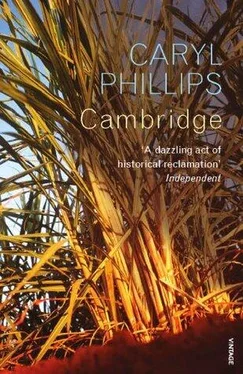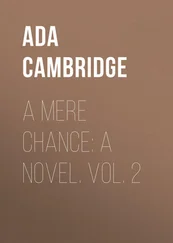Caryl Phillips - Cambridge
Здесь есть возможность читать онлайн «Caryl Phillips - Cambridge» весь текст электронной книги совершенно бесплатно (целиком полную версию без сокращений). В некоторых случаях можно слушать аудио, скачать через торрент в формате fb2 и присутствует краткое содержание. Год выпуска: 2009, Издательство: Vintage Digital, Жанр: Современная проза, на английском языке. Описание произведения, (предисловие) а так же отзывы посетителей доступны на портале библиотеки ЛибКат.
- Название:Cambridge
- Автор:
- Издательство:Vintage Digital
- Жанр:
- Год:2009
- ISBN:нет данных
- Рейтинг книги:5 / 5. Голосов: 1
-
Избранное:Добавить в избранное
- Отзывы:
-
Ваша оценка:
- 100
- 1
- 2
- 3
- 4
- 5
Cambridge: краткое содержание, описание и аннотация
Предлагаем к чтению аннотацию, описание, краткое содержание или предисловие (зависит от того, что написал сам автор книги «Cambridge»). Если вы не нашли необходимую информацию о книге — напишите в комментариях, мы постараемся отыскать её.
Cambridge — читать онлайн бесплатно полную книгу (весь текст) целиком
Ниже представлен текст книги, разбитый по страницам. Система сохранения места последней прочитанной страницы, позволяет с удобством читать онлайн бесплатно книгу «Cambridge», без необходимости каждый раз заново искать на чём Вы остановились. Поставьте закладку, и сможете в любой момент перейти на страницу, на которой закончили чтение.
Интервал:
Закладка:
On account of my arising late (in consequence of Mr McDonald's instructions that I seek further rest at either extremity of the day), the board was neither breakfast, nor lunch, but no less remarkable because of this. We began with a most agreeable forenoon drink called a beveridge, which is made from the milk of the coconut, fresh lime juice and syrup from the boiler which, though sweet, has still the flavour of the cane. The men mixed this with a small quantity of rum, but I was led to believe that this practice was something from which ladies should refrain. This beveridge was presented to us in a crystal cup lidded with silver. Along with this beveridge we had thrust upon us baskets of fruit from which, according to our physician's maxim, one should eat as much as possible since 'fruit never hurts'. Next we had trolleyed before us ham, eggs, and various breads, the favourite of which was the cassava bread. The cassava is best described as a fleshy root, the sweet variety of which is used for food. One must take care not to consume the cassava water, or juice, for it is poisonous, but the body, having been dried and baked on thick iron plates, is both wholesome and palatable. We swilled down this noonday extravagance with tea, for coffee and chocolate are deemed too heavy to be taken under the vertical rays of the mid-day sun. We then consumed a little punch, which consisted of Madeira, port and claret. Mr McDonald also took the opportunity to sup a little Bristol beer, while his guest partook of all in moderation. Perhaps I should take this opportunity of introducing our third member, for he was to play a major role in our drama.
Mr Rogers arrived in a light carriage, together with Mr McDonald. I happened to be engaged in my bed-chamber, so Stella ushered them onto the piazza for drinks. My first impression upon joining them there and casting eyes on this new guest was to note how florid and healthy was our physician, a fact I had not considered until confronted with someone against whom I might set him. Mr Rogers is a slight man who looks as though his fifteen-year sojourn in this climate has made inroads into the health of his constitution. On my presenting myself he stood, bowed graciously as one might expect of a churchman, and after some sharp colloquy we three decided to repair immediately to our table. As we did so I noted that Mr Rogers has a tendency to cough, and he peppers his words with this dry ailment. In his case he could wish for no more suitable companion than a physician.
Mr McDonald is the dominant of the two men. Almost before we had found our seats, and begun to sup the beveridge, he asked after the whereabouts of Mr Brown. I said that I assumed Mr Brown to be out in the fields. I quickly seized this opportunity to pursue the question of Mr Wilson, directing my enquiries towards our new guest. My past gambits on this subject had been effectively countered by Mr McDonald with evasiveness and some outward signs of discomfort. For his part Mr Rogers simply shook his head and confessed that some not inconsiderable time had passed since Mr Wilson had taken up residence on a neighbouring island. Unless my eyes deceived me I felt sure that I detected a knowing glance, perhaps even a reproving one, pass from Mr McDonald to the other. Possibly to avoid Mr Rogers stumbling into waters from which he would prefer his friend to steer clear, Mr McDonald took the initiative and commenced a solo rendition of his feelings about the deficiencies of absentee planters, and those they leave in charge of their fortunes.
Mr McDonald contrasted the use of the phrase 'at home', when applied by the English expatriate, with its use by the French. For the former, he always means England, but the Frenchman will determine that his island is his 'home', which naturally results in his making a greater effort to ensure its moral and social survival. The English planters look upon these islands as colonies to which they are exiled for a certain period, places containing their properties, and therefore of the greatest consequence to them, but very few expect to die on these tropical estates. Those who have troubled to bestir themselves all look forward to spending their last years in the land of their birth. They never see, or inhale the fragrance of, a creole rose without letting their imaginations stray through the rich gardens of fair England. Mr Rogers asked if this was so bad. After all, was it not only natural that one should wish to return to one's provenance? Mr McDonald stormed this defensive position and expanded his argument thus. When, according to our physician, the decline in revenues from tropical American holdings set in, the overseas owners as a class increasingly neglected to visit the tropical zone, and some among them even to care for their personal possessions. These men of the privileged pigmentation, who eschew the slightest labour as not only painful but degrading, have of late begun to exhaust their scant credit in England, transferring their holdings to the jurisdiction of agents, managers, overseers and book-keepers. They are now happy to see their properties maintained in any way, so long as they continue to reap a small reward while some profit remains.
According to Mr McDonald the day of profitable exploitation of West Indian sugar is in its eventide, due in part to trading restrictions, and in part to the new age of industry dawning in England. Thus, fewer men of calibre are wont to appear in the tropics, and the dire consequences of abandoning control to others are everyday visible. Throughout the region places once of honour and trust are being gradually filled by mediocrities and scoundrels. Multiple office-holding has apparently become commonplace and is being carried out to extravagant lengths, as self-created lawyers, self-educated physicians, and venal merchants carry the day. The good doctor swears that at any moment the legislative and administrative organization of our own island is likely to collapse, and he is sure that there can be few local estates not now hopelessly entangled in debt, and indeed he insists that many are probably mortgaged beyond their real value.
It was at this crossroad that I felt I ought to remind my companions, in as pleasant a fashion as possible, of my position as the daughter of an absentee owner. While it would be true to claim that my father has a healthy annual income returned to the mother-country, and has also been known to indulge in the common practice of borrowing heavily with his trans-Atlantic properties as security, surely the fact that I had arrived to inspect the estate made him less culpable than these absentee blackguards. They agreed, but suggested that their basic argument was sound. Absenteeism was the primary cause of social breakdown, for just as one could not run a school without a headmaster, or a monarchical system without a monarch, one could not hope to run these tropical possessions without commitment to responsibility at the highest level. It was further suggested that in the West Indies the white expatriate of upper rank is liable to become simply indolent and inert, regardless of all but eating, drinking and self-indulgence. 'What is a man, If his chief good and market of his time, Be but to sleep and feed?' Mr McDonald declared. The passion with which he declaimed these lines from Hamlet surprised me not a little. I had not thought him so excitable. In the lower orders, they are the same, with the addition of conceit and tyranny, considering the negroes to be creatures formed merely to administer to their ease, and to be subject to their vagary. These degraded white people appear to be the offscum, the offscouring, indeed the very dregs of English life. It is near impossible, contended our physician-politician, to persuade these white people, high or low, that blacks are human beings, or that they might possess souls.
Читать дальшеИнтервал:
Закладка:
Похожие книги на «Cambridge»
Представляем Вашему вниманию похожие книги на «Cambridge» списком для выбора. Мы отобрали схожую по названию и смыслу литературу в надежде предоставить читателям больше вариантов отыскать новые, интересные, ещё непрочитанные произведения.
Обсуждение, отзывы о книге «Cambridge» и просто собственные мнения читателей. Оставьте ваши комментарии, напишите, что Вы думаете о произведении, его смысле или главных героях. Укажите что конкретно понравилось, а что нет, и почему Вы так считаете.












